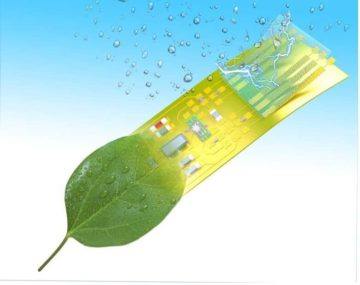Mary Dettloff in Phys.Org:
 A research team from the University of Massachusetts Amherst has created an electronic microsystem that can intelligently respond to information inputs without any external energy input, much like a self-autonomous living organism. The microsystem is constructed from a novel type of electronics that can process ultralow electronic signals and incorporates a device that can generate electricity “out of thin air” from the ambient environment. The groundbreaking research was published June 7 in the journal Nature Communications.
A research team from the University of Massachusetts Amherst has created an electronic microsystem that can intelligently respond to information inputs without any external energy input, much like a self-autonomous living organism. The microsystem is constructed from a novel type of electronics that can process ultralow electronic signals and incorporates a device that can generate electricity “out of thin air” from the ambient environment. The groundbreaking research was published June 7 in the journal Nature Communications.
Jun Yao, an assistant professor in the electrical and computer engineering (ECE) and an adjunct professor in biomedical engineering, led the research with his longtime collaborator, Derek R. Lovley, a Distinguished Professor in microbiology. Both of the key components of the microsystem are made from protein nanowires, a “green” electronic material that is renewably produced from microbes without producing “e-waste.” The research heralds the potential of future green electronics made from sustainable biomaterials that are more amenable to interacting with the human body and diverse environments. This breakthrough project is producing a “self-sustained intelligent microsystem,” according to the U.S. Army Combat Capabilities Development Command Army Research Laboratory, which is funding the research.
Tianda Fu, a graduate student in Yao’s group, is the lead author. “It’s an exciting start to explore the feasibility of incorporating ‘living’ features in electronics. I’m looking forward to further evolved versions,” Fu said.
More here.
